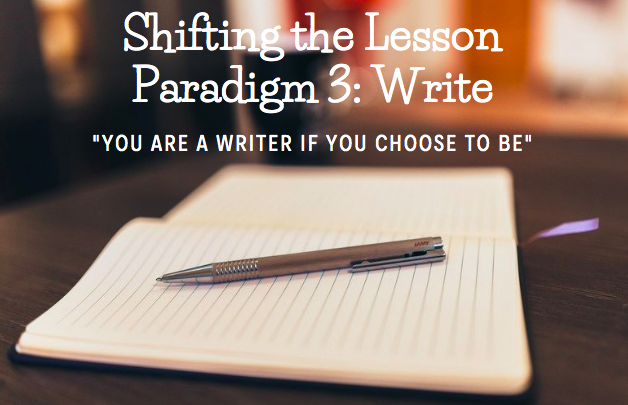I want you to do something for me. It’ll only take three minutes, I promise. I want you to get a pen and a piece of paper. Once you’ve done so, set a timer for three minutes. Then, using the prompt below, I’d like you to write until the timer expires. Before you start, don’t focus on grammar or spelling, don’t stress about the quality of your ideas, and don’t be concerned with whether or not you’re answering the prompt “correctly”. I just want you to try to write for the full three minutes. Are you up for the challenge? If so, start your timer and take a look at the prompt below. I’ll be waiting on the other side of three minutes for you.
Prompt: Respond to a character from a recent book, movie, or show in any manner of your choosing.
Well? How did you do? Hopefully, you had fun writing. Maybe you wrote something of which you’re proud. If not, perhaps, at the very least, you wrote down something that you hadn’t actually articulated before. Or, maybe, you just skipped down to this part of the post!? If anything, though, that was probably a little tougher than you initially considered. I know it was for me when I first started implementing these quick writes and began modelling writing for my students. In any event, if you did write, congratulations, I’m proud of you! If not, it’s ok, my feelings aren’t too hurt.
Each day in class, once my students have had time to read, I have them write by way of daily quick write, which are a series of predeveloped prompts. Often, I’ll choose a prompt that is relevant to what we are learning that day. Students then have anywhere from three to five minutes to write a response to the prompt. I encourage my students, just as I did with you, to focus purely on writing for the entire time and to disregard spelling, grammar, diction, syntax, the strength of ideas, or any judgements.
You might wonder why, as an English, I actively encourage my students to disregard these elements of their writing? The answer: we should be fostering an enjoyment of writing within our students and encouraging them to get their ideas from head to page rather than critically analyzing every detail of their work. Of course, if I am assessing the work, I have my students take more care in the development of their writing and I’ll provide specific feedback along the way. But, if the task is formative, then I want to champion a student who has been actively engaged in the writing process.
These prompts vary in tone and challenge. Sometimes, the prompt will be more simplistic, and, at other times, I give students the choice to select their own prompt. Sometimes, I might project a quotation from a ‘must read’ book and will have students respond to that quotation in a manner of their choosing. Really, they can write whatever they want because the task is not about the product but rather the process. In doing so, along with exposing them to samples of great literature, I’m hoping that students learn how to engage in the writing process and to refine their writing skills over the course of the year.
When students write, I start a timer and cue them with suggestions to get them started. As the year goes on and they get used to this process, I cue less and less, and, eventually, I write alongside the students, which is a teaching strategy that I’ve adopted from Penny Kittle. I will project my work, in real-time, and write the same prompt that they are writing in hopes that they can get a sense of what the writing process should look like: difficult, messy, uncertain, yet rewarding. I remind the students that my response is not the gold standard, but rather a sample of that real-time process.
Through this process, though I have no real basis for measurement, I’ve seen marginal improvements in student writing across the board. Further, when asked about the degree of confidence in their own writing, most students responded that the quick writes have helped them. Either way, students are writing more: small victories. Certainly, there is a time for high stakes writing and for comments and feedback. But there is also a time to simply allow students to write, learn the process, and hopefully come to enjoy it.
I often hear students tell me that they aren’t writers, but then I have them flip through their notebooks and see the writing that they’ve accomplished to date. In doing so, I have them rethink their initial analysis of their abilities by reminding them that “you are a writer if you choose to be.” Students are writers if they choose to be. That doesn’t mean that they’re all going to be great novelists or even great writers, but how can we expect to be good at something if we never practice? How can we, as teachers, expect students to progress if we don’t give them the opportunity to identify as writers? That’s why, each class, students are given time to practice, time to get better, and time to refine their writing skills. Each class, students are given time to write.
If you’ve made it this far, actually completed the prompt, and are feeling brave, share your response to the prompt in the comments below! We ask students to take risks every day with us, so I’m hoping you’ll take this risk with me. Who knows, you may be surprised by the outcome?
Follow and tweet @bjeblack!
